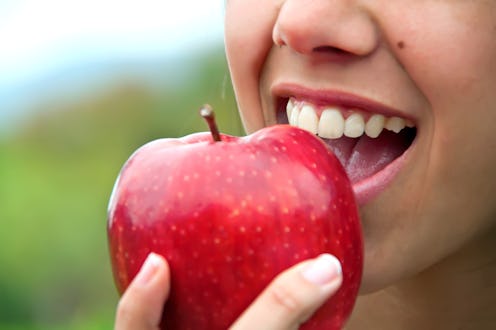Life
People Who Are Upset By Loud Chewing Noises Face Yet Another Unexpected Side Effect
Are you not a fan of noisy chewers? Is living with loud eaters your own personal version of hell? Your annoyance could be affecting you beyond your enjoyment at dinner table. A new study on how learning is affected by misophonia — the scientific term for extreme sensitivity to noises like chewing, slurping, and eating — suggests that people who are particularly sensitive to certain noises could have a harder time with information retention when subjected to those noises.
The recent research, published in the scientific journal Applied Cognitive Psychology, was conducted among a group of 72 college students. Students were randomly sorted into two groups: one that would study in silence and another that would study while a decoy student loudly chewed gum. Both groups of students were given six minutes to study the subject matter (migraines, ironically), and then both groups took a comprehension test in complete silence. There were no significant differences in overall results between the two randomly sorted groups.
However, students who scored higher on misophonia sensitivity (AKA those students who were particularly sensitive to sounds like chewing gum) performed worse on the comprehension test if they studied with the gum chewer. Those with higher misophonia sensitivity who studied in silence performed better on the test.
“Some people are especially sensitive to relatively subtle specific background sounds like chewing,” study author Logan Fiorella told TIME, “and this sensitivity can be distracting enough to impair learning.” Researchers didn’t look specifically at whether background noises heard while taking a test had an effect on performance. However, as the results suggest, it appears to have an effect on the learning period.
Fiorella also noted that none of the subjects in their study had especially severe misophonia, meaning those whose sensitivity is heightened may feel these affects even stronger.
The effects of misophonia can go beyond impaired learning or just a mild level of annoyance. A study on misophonia published last year found that those who have more extreme sensitivity may experience more extreme distress when subjects to “trigger noises.” Anxiety, anger, even panic attacks can be triggered when a person with extreme misophonia hears distracting noises like chewing or loud breathing.
These recent studies are likely reassuring to those who have misophonia, as many even within the scientific community are skeptical that the sensitivity even exists at all. In a press release for a recent study documenting the physical effects of misophonia (the first time such effects had been scientifically documented) lead researcher Dr. Sukhbinder Kumar said, “For many people with misophonia, this will come as welcome news as for the first time we have demonstrated a difference in brain structure and function in sufferers.”
Some people exist on the opposite side of the spectrum, finding relaxation and satisfaction in certain sounds others may find completely unbearable. If you’re not exactly sure where you stand, there are plenty of misophonia test videos online that will give you an indication. While, of course, they don’t qualify as an actual, medical diagnosis for misophonia, they may give you some personal insight as to why you cannot concentrate on a movie when other theater-goers are chomping down on popcorn around you.
As for what to do if you’re trying to study? Invest in a good pair of headphones and find a quiet study spot. “It may be especially important for students with higher levels of misophonia sensitivity to avoid studying in places where there are a lot of ‘trigger’ sounds, such as other people chewing, coughing, clicking pens, or rustling papers,” Fiorella told TIME. “When that’s unavoidable, some strategies suggested by other researchers include using earplugs, focusing on one’s own sounds, or using positive internal dialogue.” There’s also study music if you find that more relaxing than, say, gum smacking.
